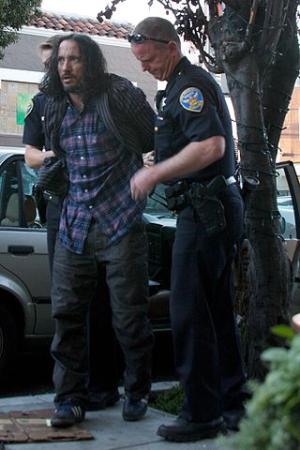Drug War Issues
Politics & Advocacy
At the end of February, state Sen. Mark Leno (D-San Francisco) introduced a bill that would make drug possession for personal use a misdemeanor in California. If the bill passes, California would join 13 other states and the District of Columbia that have taken the cost-saving and rehabilitation-aiding step of not making felons out of mere drug users.

California needs to reduce prison and jail overcrowding (US Supreme Court)
A felony conviction doesn't just mean jail or prison time. It becomes a permanent barrier to reentry into society, making access to education, employment, and housing more difficult, as well as barring people with such convictions from obtaining professional licenses and subjecting them to various other obstacles.
The bill is backed by an array of drug policy, civil liberties, and human rights groups, including early supporters the American Civil Liberties Union, the California State NAACP, the Drug Policy Alliance, and the Ella Baker Center for Human Rights.
Budget-conscious California voters have shown an interest in drug sentencing reform in the past. In 2000, they passed Proposition 36 to divert drug offenders from prison to treatment by a margin of 61%. Since then, the state's economic situation has only gotten worse, and pressure to do something about its gargantuan $9.3 billion corrections budget is on the rise.
A Lake Research Partners poll released last April found that 72% of respondents favored changing drug possession from a felony to a misdemeanor, with 40% saying small-time drug possession for person use should be considered an infraction, with no jail time. Strong support for such a reform cuts across party lines, with support among Democrats at 79%, among independents at 72%, and among Republicans at 66%.
"Over the years we have learned that long prison sentences do little to deter or limit personal drug use," said Sen. Leno. "In fact, time behind bars and felony records often have horrible consequences for people trying to overcome addiction because they are unlikely to receive drug treatment in prison and have few job prospects and educational opportunities when they leave. This legislation will help implement public safety realignment and protect our communities by reserving prison and jail space for more serious offenders," he said.
"This bill merely revises the charge from a felony to a misdemeanor," Leno told the Chronicle Tuesday. "It will save the counties about $160 million a year, according to the Legislative Analyst's Office, and the state another $65 million. Thirteen states have already done this, and they have higher rates of treatment and lower rates of drug use and property and violent crime."
"The war on drugs has been an abysmal failure we can no longer afford," said Allen Hopper, Criminal Justice and Drug Policy Director at the ACLU of California. "California voters agree the punishment should fit the crime, and a felony for simple possession is ridiculous. Those who are addicted to drugs need treatment, not a jail cell and a felony conviction with severe and life-long consequences, like reduced access to job opportunities, student loans, and small business loans."

Drug possession would be a misdemeanor in California rather than a felony if SB 1506 passes (wikimedia.org)
The push for the bill is picking up steam, Dooley-Sammuli said.
"We have quite a broad coalition, and the list of groups coming out in support is long and getting longer by the day," she said. "We have faith, treatment, and housing groups; we have job placement organizations; we have family members and other folks who realize the this penalty is just too harsh. We've just added two more: California Attorneys for Criminal Justice, a defense attorneys' group, and the William Velasquez Institute, a group that will bring Latino communities into the process of helping to shape policies that impact them."
While an impressive coalition is budding to support the bill, and while polls suggest strong public support for such a measure, not everybody is on board, particularly law enforcement.
"We're opposed to this bill for a variety of reasons," said John Lovell, a Sacramento attorney who is a lobbyist for the California Police Chiefs Association. "We don't think it's appropriate to reduce these offenses to misdemeanors because of severe unintended consequences. No one in California is being incarcerated for a first or second drug possession offense; instead, they are sent to a Proposition 36 drug treatment program," Lovell told the Chronicle.
"We believe this will create a disincentive for people to participate in a Prop 36 treatment program, and that is not a good thing," the lobbyist continued. "To the extent we can have a successful treatment result, that is one less person in a cycle of drug addiction."
"Oh, please!" exclaimed Dooley-Sammuli. "Lovell said the same kinds of things when Prop 36 passed. They were saying the sky would fall, that nobody would be in treatment and there would be crime in the streets, but the crime rate continues to go down."
Given the current fiscal constraints on the state criminal justice system, the "real world" result of downgrading drug possession to a misdemeanor would be that drug offenders essentially walk free, Lovell said.
"Say a person is convicted of meth possession," he said. "He is told he has a choice of Prop 36 treatment or going to the county jail, but the jails are all filled to capacity, and nobody does any time for a misdemeanor offense. An attorney representing such as person is ethically bound to say 'If you refuse treatment, there is no real sanction at all,'" Lovell maintained. "These will be misdemeanants, not felons, not under supervision and not breaking the cycle of addiction, which means the crimes they commit to purchase their dope will continue," he said. "It's not like you get a scholarship to pay for the cost of your meth."
But the bill provides for up to three years probation -- five years in some cases -- and would allow judges to order drug treatment as a condition for probation.
Saying that the state will benefit from saving money on not prosecuting drug users as felons is "a hackneyed argument," Lovell said. "If you say it will save money because these people aren't being supervised, yes, it will save that money, but if they're not being supervised they're more likely to go out and commit the economic crimes addicts commit. It's not so much a savings as a cost shift," he argued.
"We do not see this bill as yielding any positive public policy results," Lovell summed up.
"None of California's existing programs to make treatment available will be affected by this," countered Dooley-Sammuli, "and counties will have the freedom to use these dollars more wisely to make treatment more available. Compared to five years ago, treatment dollars have absolutely been gutted, and we're really working to identify ways to preserve funding so we can protect treatment. It's really disingenuous for our opponents to talk about this getting in the way of access to treatment. If Jerry Lovell is worried about access to treatment, we call on him to support this bill."
Leno responded more tersely to Lovell's arguments. "He's a dogmatic extremist. If you think drug use is a bad thing, the states that have actually lowered drug use are not felony states," the San Francisco Democrat said. "By making these offenses misdemeanors, we can remove barriers to housing, education, and employment -- the very things a felony conviction makes it more difficult to obtain, those unintended consequences of a felony conviction."
Now, it's up to the measure's supporters to get it moving. The bill will be heard in the Senate Public Safety Committee next month. For it to pass this year, it has to get out of committee, win approval in the Senate, and then go through the same process in the Assembly. And it has to happen by August, when the session ends.
"It's a very tight time-frame," said Dooley-Sammuli. "We're still educating people about this bill, but this is a serious effort, and we believe we can get that support with the right coalition partners and more education. Sen. Leno doesn't introduce bills just to make a statement, but because he thinks they have a political chance."
"We're looking for support anywhere and everywhere," Leno said. "We are talking to law enforcement agencies to educate them that there is no data showing that felony convictions reduce drug use."
There's clearly some work to be done on that score. But more important is getting actual legislators to vote for the bill.
"I believe there will be significant, and hopefully sufficient, Democratic support for the bill," said Leno, "and I'm also hoping Republican colleagues will see we can't waste the money and must invest in evidence-based programming."
California has the chance to pass a smart, cost-effective, and humane drug sentencing reform bill, but the clock is ticking.
The other states that treat drug possession as a misdemeanor are Delaware, Iowa, Maine, Massachusetts, Mississippi, New York, Pennsylvania, South Carolina, Tennessee, West Virginia, Wisconsin, and Wyoming, as well as the District of Columbia.
Permission to Reprint: This content is licensed under a modified Creative Commons Attribution license. Content of a purely educational nature in Drug War Chronicle appear courtesy of DRCNet Foundation, unless otherwise noted.
Comments
writing on the wall
Sounds like California has a bunch of Sadists running the Prison Complex . The State Government . The Budget . You have to remember that Decrim. and Legalization will put more than a few government workers out on the street . Looking for a new job . Where you actually have to produce something for your $$$ . The " Prosecutors " are in a rage at the coming Tsunami of Cannabis Legalization . How do you stop a Tsunami ? With a Law ? With a Policy ? Watching it happen is a pleasure .
The war on drug people.
Just like alcohol prohibition it can never work. We have spent billions on law enforcement and incarceration, to what benefit? Any objections to this legislation should be told to research Portugal.
John Lovell is a man with
Paid annoucment by an attorney
Since when is John Lovell an attorney at law, Have become an expert in social psychology . NOT !
Shut up please ! Let the experts speak and no more commits from the peanut gallery Mr. Lovell !
totally in agreement with
totally in agreement with passing this new law. this prop 36 bullshit doesn't work all ca is doing is making these people do prop then they still try to do drugs and get away with it and most people i know do get away with it for a while then they get arrested go to court get probation revoked then reinstated and released and they have strike 1 give it a few weeks strike 2 couple more weeks strike 3 bam they have failed prop go do 90 days (but jails to full)so they get half time 45 days get out and there not on prop anymore. its a complete joke ca needs to realize trying to force anyone to stop doing drugs isn't going to fly that person has to want to stop using drugs for it to work going to jail just makes it worse and adds to there anger and when they get out they are worse of a user than before
Add new comment